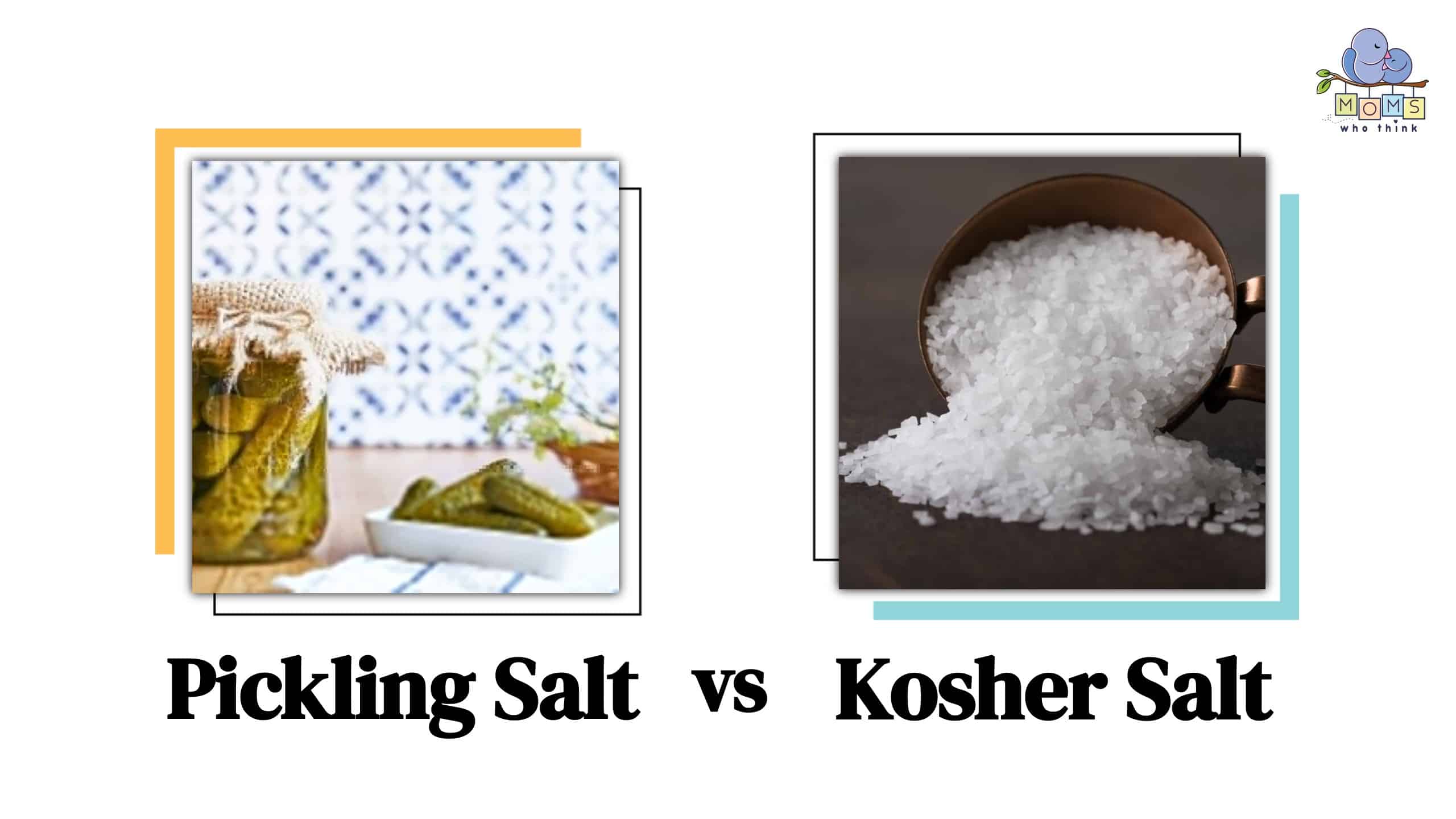Canned salt contains anti-caking agents and is more refined, whereas, kosher salt is less refined. Salt is one of the most versatile ingredients in any kitchen. Not only does it add flavor, but it also plays a crucial role in the chemistry of cooking. With so many types of salt available, it's important to know the differences and how they can affect your recipes. In this article, we will compare canned salt vs. kosher salt. Both are common types of salt used in the culinary world and are useful additions in many homes. By understanding the unique properties of each, we hope that you'll be able to make an informed decision when choosing the right salt for your cooking needs.
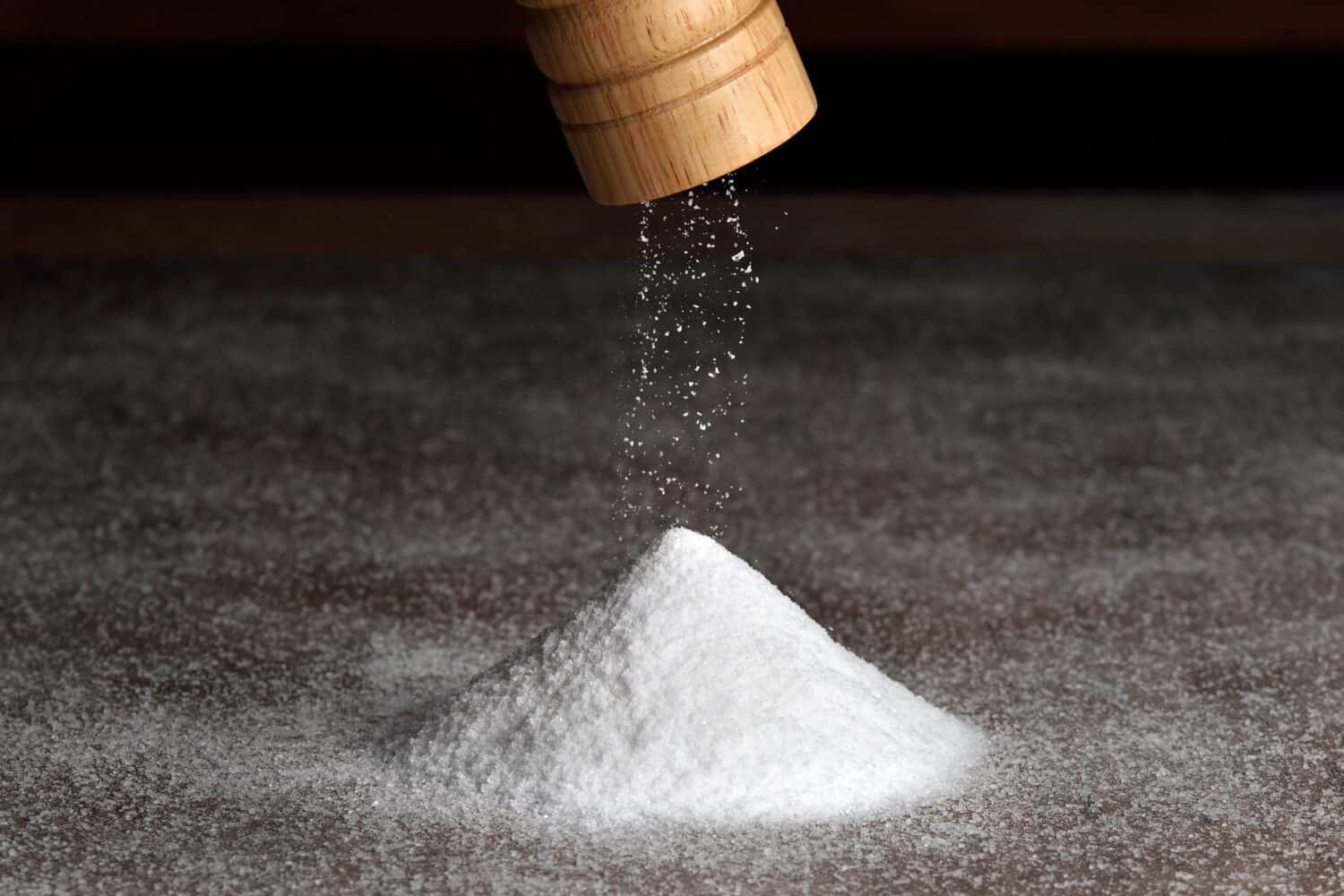
©Coryn/Shutterstock.com
The Ultimate Guide to Canned Salt and Kosher Salt
When it comes to seasoning your food, salt is a crucial ingredient that can make a dish go from bland to delicious in a moment. However, choosing the right type of salt can be overwhelming with so many varieties available.
What is Canned Salt?
Canned salt refers to the finely ground table salt that you can find in your local grocery store. It's called “canned” because it's typically sold in a canister, packet, or shaker. It is known for its natural minerals which assist in removing blood from meat.
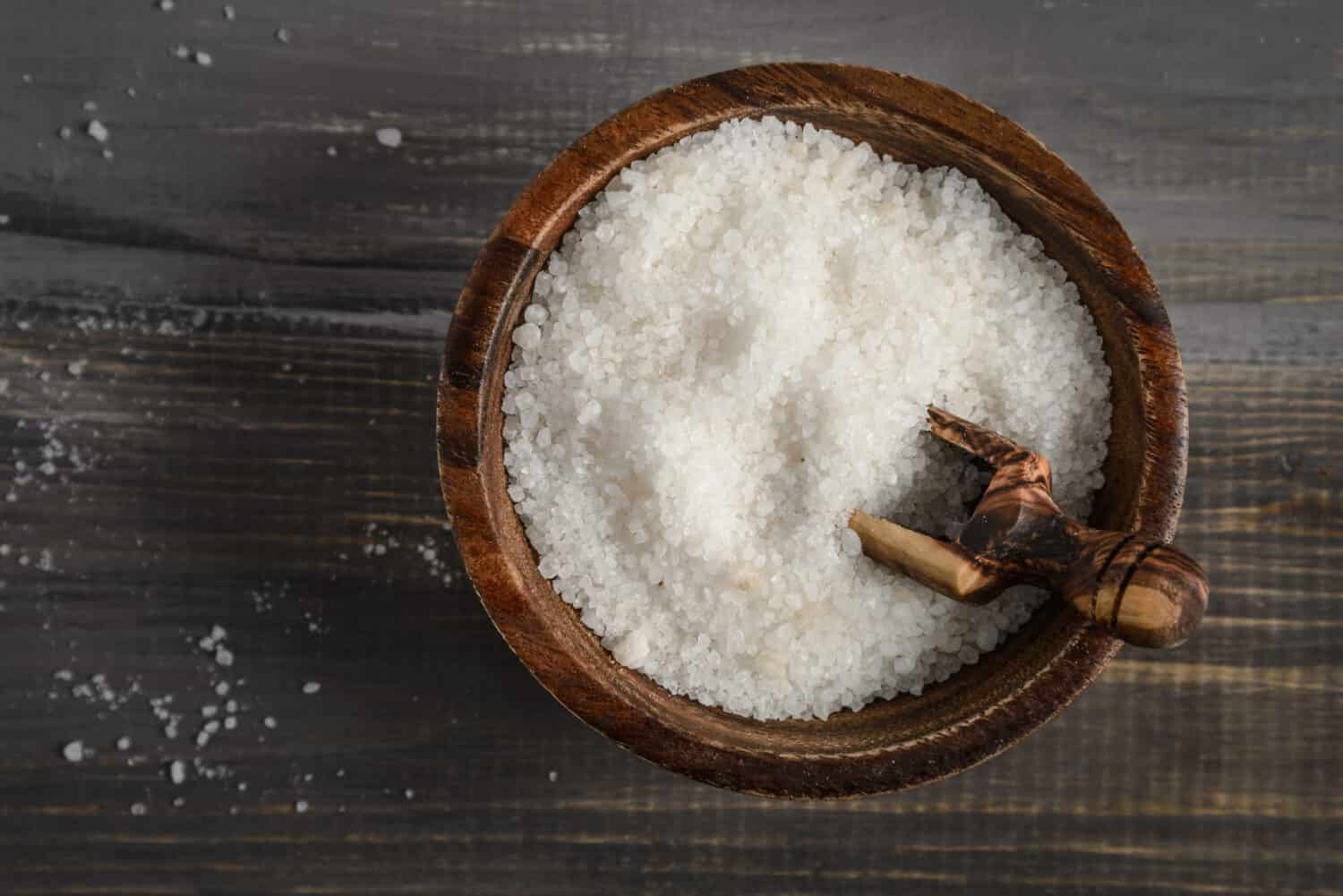
©Albina Bugarcheva/Shutterstock.com
What is Kosher Salt?
Kosher salt has its name because it's the type of salt that is used in the koshering process of meats. The term “kosher” refers to a Jewish dietary framework for handling, preparing, and eating food because in certain Jewish traditions eating meat that contains blood is forbidden. Kosher salt is more coarse and absorbent than canned salt and contains no nitrates or nitrites. This is why it is not used for curing or preserving meat.
What Are the Main Differences Between Canned Salt and Kosher Salt?
The key differences between canned salt and kosher salt are the size of the crystals and the processing. Canned salt has small, uniform crystals that are highly refined, while kosher salt has larger, irregularly shaped crystals and is less refined. This affects how they dissolve and distribute in food, as well as their overall flavor effect.
The Chemistry of Salt and How It Affects Your Cooking
Salt is made up of sodium and chloride ions, and it works by enhancing flavors, balancing sweetness, and masking bitterness. It also tenderizes the meat and preserves food.
How Different Types of Salt Affect Flavor and Texture of Food
Different types of salt can affect the flavor and texture of food. For example, kosher salt has a milder flavor and crunchier texture compared to canned salt, which is finer and has a more concentrated saltiness. This means that if you were to use the same amount of kosher salt as canned salt, you may end up with a dish that is too salty.
Factors to Consider When Choosing Salt
Consider the level of saltiness, the texture, and the flavor impact the salt will have on your dish. Canned salt is suitable for most recipes, while kosher salt is best used in recipes where the texture and crunch of the salt are desired, such as seasoning meat or adding it to your dish once served. When adjusting salt in recipes, it's important to taste as you go, and add salt in small additions to ensure that it's not over-salted.
Advantages of Canned Salt
Canned salt is readily available and easy to find in most grocery stores. It's also finely ground, which means it dissolves quickly and evenly in most recipes.
Disadvantages of Canned Salt
Canned salt is heavily processed and can contain anti-caking agents that may affect the flavor of your dish. Anti-caking ingredients are known as silica, flour, and starch. It's also more difficult to control the amount of salt being added due to its fine texture.
The Pros and Cons of Kosher Salt
When it comes to choosing the right type of salt for your cooking, there's a lot to consider. One popular option is kosher salt, which is known for its large, coarse grains and clean taste. But is kosher salt the best choice for every dish? Let's take a look at some of the advantages and disadvantages of using this type of salt.
Advantages of Kosher Salt
One of the biggest advantages of using kosher salt is its texture. The large grains make it easy to control how much salt you're adding to your dish, and they dissolve quickly and evenly. This can be especially helpful when you're seasoning meat since the salt will penetrate the surface more easily. Another advantage of kosher salt is its fresh flavor. It doesn't contain any additives or anti-caking agents, so it won't affect the taste of your food.
Disadvantages of Kosher Salt
One potential downside of using kosher salt is that it can be more expensive than other types of salt, especially if you're buying a name-brand product such as Diamond Crystal and Morton it could cost you up to $18 for 3lbs. It also takes up more space than finer salts like table salt or sea salt, so it may not be as convenient for storage.
Another consideration is that the large grains of kosher salt can make it harder to achieve precise measurements in baking or other recipes where ratios are important. If you're not careful, you could end up with a dish that's too salty or not salty enough.
Using Canned and Kosher Salt in Different Cooking Methods
Now that we've explored some of the pros and cons of kosher salt, let's talk about how to use it in your cooking. Depending on the dish you're making, you may want to use a different type of salt.
When to Use Canned Salt
Canned salt, also known as table salt, is a fine-grained salt that's been processed to remove impurities and add iodine. It's the most common type of salt used in American homes, and it's often used in baking and other recipes where precise measurements are important. It's also a good choice for brining and pickling because it dissolves quickly.
When to Use Kosher Salt
Kosher salt is a great choice for seasoning meat and other food since the large grains will hit the surface more easily and are more visible. It's also commonly used to season vegetables and salads since the flavor won't overpower the other ingredients.
Cooking Tips for Using Canned and Kosher Salt
No matter what type of salt you're using, there are a few general tips to keep in mind. First, always taste your food as you go to make sure you're adding just the right amount of salt. Remember that different types of salt have different levels of saltiness so, be mindful of how much salt you're adding, and try to use it sparingly to avoid a dish that's too salty.
Which Type of Salt is Best for Your Health?
When it comes to health, there's a lot of debate about the role of salt in our diets. Some people argue that salt is essential for good health, while others believe that too much salt can lead to health problems like high blood pressure and heart disease. So what's the truth?
The Health Effects of Salt
The truth is that salt can be both good and bad for your health, depending on how much you're consuming and what type of salt you're using. Sodium, which is the primary component of salt, is essential for regulating blood pressure and maintaining fluid balance in the body. However, consuming too much sodium can lead to high blood pressure, which is a risk factor for heart disease and stroke.
Comparing the Nutritional Value of Canned Salt and Kosher Salt
In terms of nutritional value, there's not a lot of difference between canned salt and kosher salt. Both contain sodium and chloride, but kosher salt may have slightly lower levels of iodine. The bottom line is that if you're trying to reduce your sodium intake, it's important to be aware of how much salt you're consuming overall, regardless of the type.
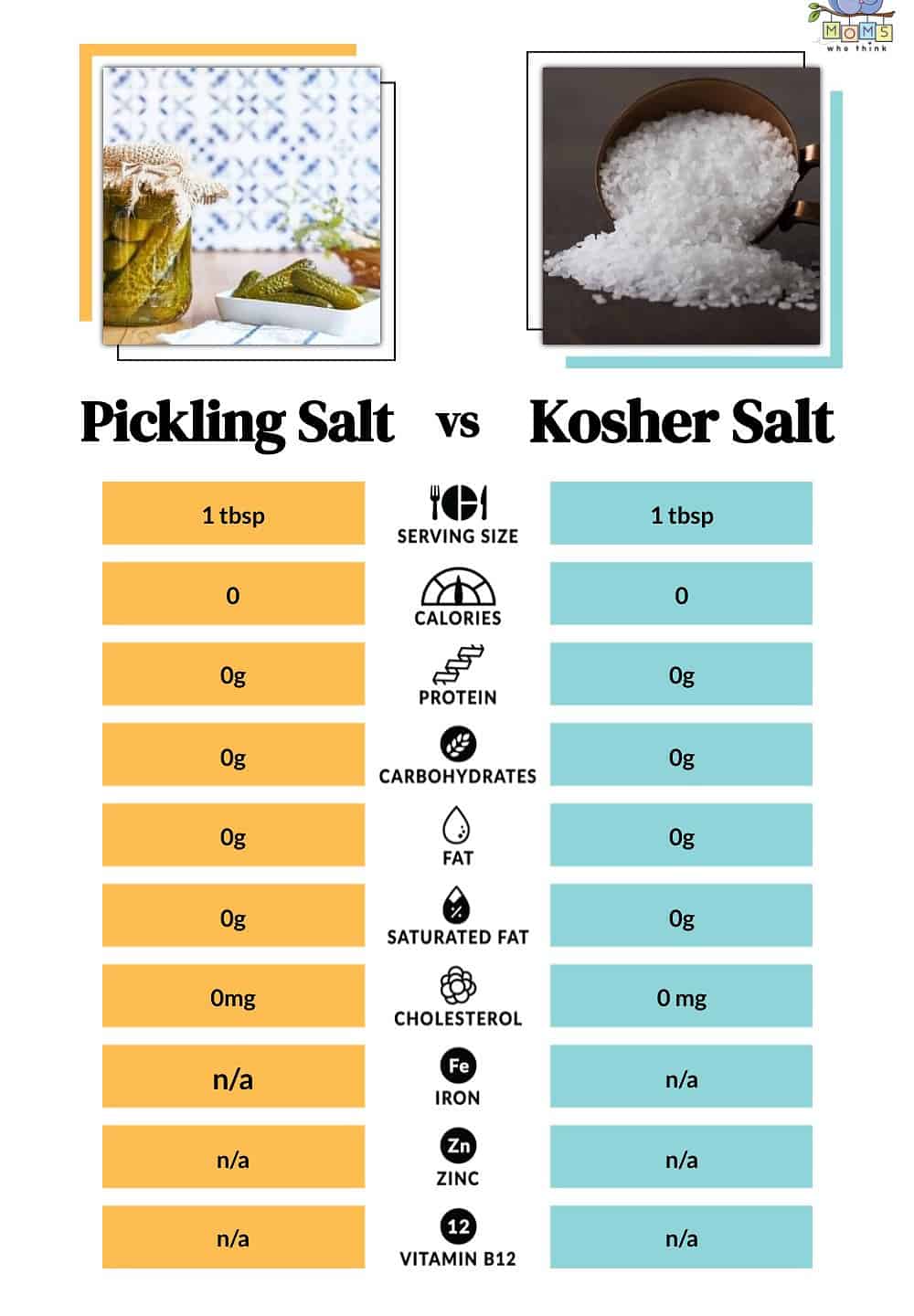
Conclusion: Making the Right Choice for Your Kitchen
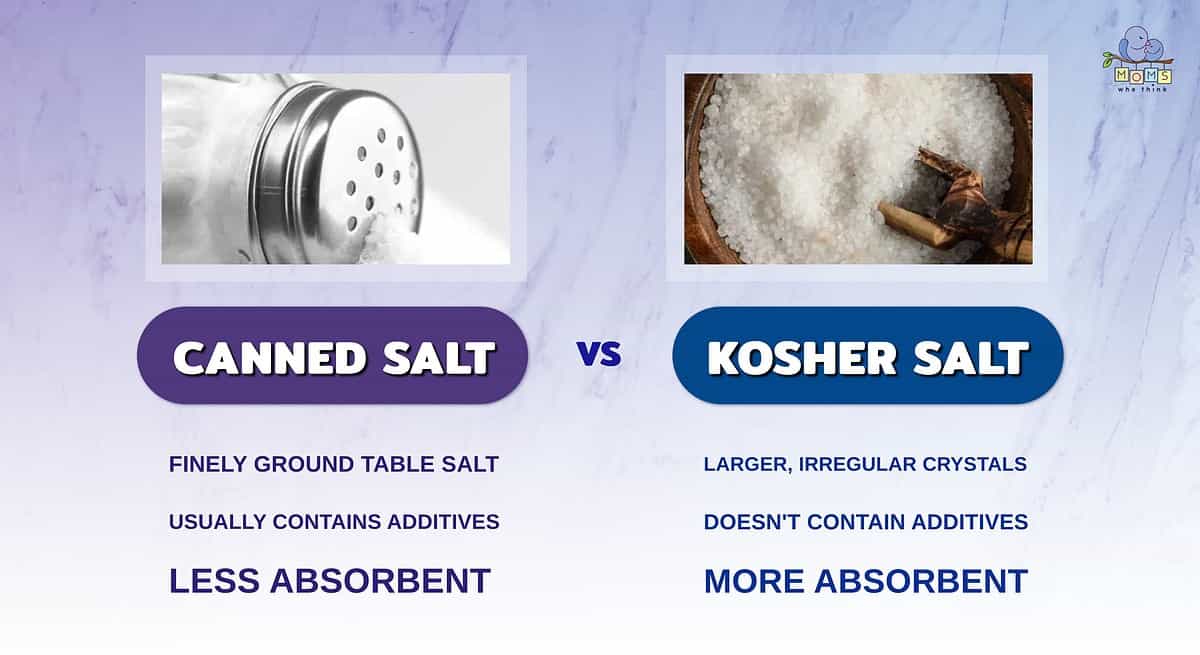
- Canned salt refers to the finely ground table salt that is often sold packaged in stores. Kosher salt has larger, irregular crystals, making it easier to use in dishes.
- Kosher salt doesn't contain any additives, such as anti-caking agents. If additive-free salt is important to you, kosher salt is the way to go!
- Kosher salt is more absorbent than canned salt, making it ideal for koshering food. Koshering refers to the process of removing blood from meat.
Choosing the right type of salt for your cooking can feel overwhelming, but it doesn't have to be. By understanding the pros and cons of different types of salt, as well as how to use them in different cooking methods, you can feel confident in your choices. Whether you prefer kosher salt, table salt, or another type of salt, the most important thing is to use it in moderation and enjoy the flavors of the food you're creating. Both types of salt have their benefits and drawbacks, and understanding these differences can elevate your cooking to the next level. By experimenting with both canned salt and kosher salt, you can find the perfect balance of saltiness and flavor in your dishes. Happy cooking!
FAQ
What is the main difference between canned salt and kosher salt?
Canned salt is finer and has more additives compared to kosher salt. Kosher salt has larger crystals and no additives, making it a better option for seasoning meat and vegetables.
Can I substitute canned salt for kosher salt in recipes?
Yes, but you will need to adjust the amount of salt you use. Canned salt is finer, more compact, and contains more salt per volume than kosher salt. As a general rule, use 1/4 teaspoon of canned salt for every 1/2 teaspoon of kosher salt.
Is one type of salt healthier than the other?
Both canned salt and kosher salt are chemically identical and contain the same amount of sodium per serving. However, canned salt may contain additives that are not present in kosher salt. If you are looking for a healthier option, choose sea salt or Himalayan pink salt, both of which contain trace minerals and are minimally processed.
Which type of salt should I use for baking?
When baking, it's best to use canned salt, which dissolves quickly and evenly.
Which type of salt is best for pickling?
For pickling liquids, wet brines, and meat-preserving methods, canning salt is the best salt to use, while kosher salt is better for seasoning meats and vegetables before or after cooking.
Healthy Recipies
Feeling hungry? Try one of these delicious dishes and surprise the family with a new meal tonight.
Print
Cilantro and Lime Beef Enchiladas
Ingredients
1–2 T. extra virgin olive oil
1 pound lean ground beef (You can also use rotisserie chicken)
1 medium onion, minced
3 cloves garlic, pressed
1 green pepper, finely chopped
1 T chili powder
1/2 tsp cumin
1/2 tsp coriander
1/2 tsp oregano
1/2 tsp freshly ground black pepper
3/4 tsp kosher salt
1 cup sour cream
Juice of 1 Lime
1 c Mexican blend cheese
2 T chopped fresh parsley or cilantro
1 (8-oz) can tomato sauce
10–12 small flour or corn tortillas
1–2 (10-oz) cans of red enchilada sauce
2 cups shredded cheddar or Colby Jack cheese
Instructions
1. Set your oven to 350 degrees F.
2. In a large skillet over medium heat, add your beef, garlic, onion, green pepper and spices. Cook until beef is cooked through and onion is translucent.
3. Pour into a bowl and add your sour cream, Mexican blend cheese, parsley or cilantro, lime juice, and tomato sauce. Add mixture to tortillas, roll them up and place them in the pan. Pour enchilada sauce over the top and add your remaining cheese. Bake uncovered for about 20 minutes (until cheese is melted), and top with cilantro, sour cream, salsa, tomatoes, chopped lettuce, olives or any other desired toppings. Cook up some Mexican rice to serve with the beef enchiladas.
